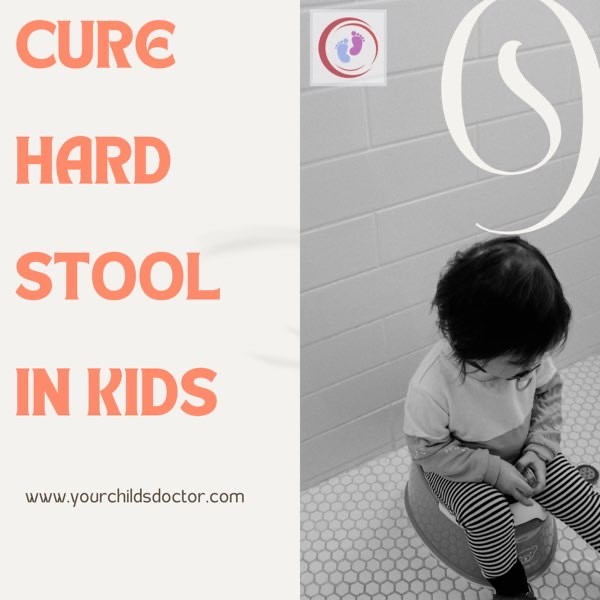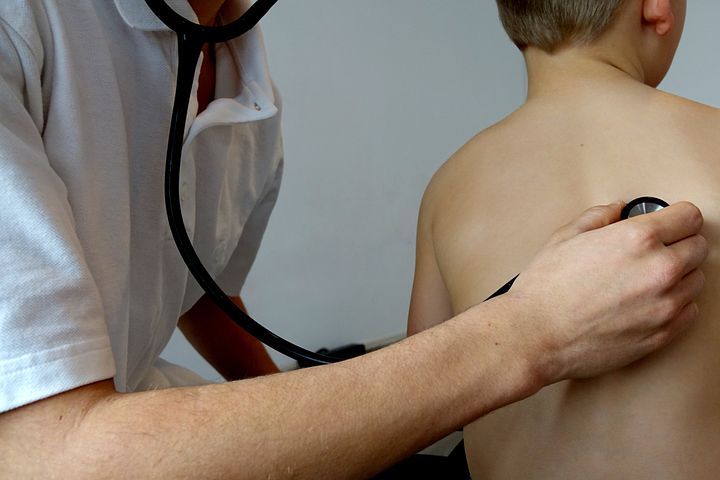It is true that, hard stool in kids can create panic among parents. Recently as more and more kids are suffering from hard stool and constipation, it is worthwhile for parents to understand its basic mechanism. And also it is critical to find out solution to constipation.
Constipation vs hard stool
Laymen think that “constipation” and hard stool are synonymous. Even so they are not. ‘Hard stool’ is a part of constipation.
What is constipation?
Actually constipation has two components.
- First one is ‘difficulty’ in passing motion or painful defecation. Which ensues when stool is hard. This may be large in size or pellet like.
- Second element is ‘delay’ in passing stool or infrequent defecation. This is when, child passes less than 3 stools per week.
This delay and difficulty in passing motion is so significant that it causes severe ‘distress’ in day to day life of child.
Note :
Out of these two sub-components, difficulty in passing stool or hard stool is the most important factor. For example if a child passes once in every 5 days, howbeit stool is soft, then it can not be regarded as constipation.
5 RULES TO DEAL WITH HARD STOOL IN KIDS
The major underlying reason for constipation lies in diet and lifestyle. Hence a change in diet and lifestyle can provide remedy to most constipation cases. Additionally there are other methods as well to deal with hard stool in kids.
All these methods are divided in to 5 broad categories, as showcased below in a pictorial form.
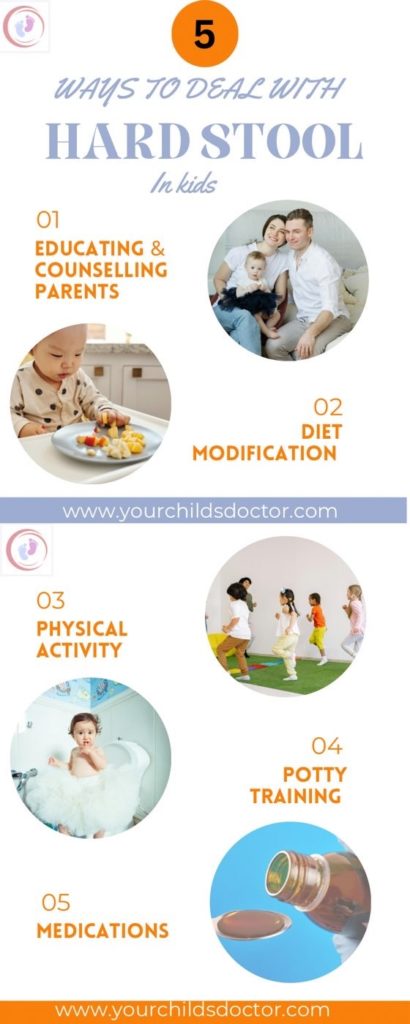
Here in this blog, we will go into each approach step by step.
1.EDUCATING & COUNSELLING PARENTS
“Paediatrician’s job is tricky. It is less about treating the actual disease in child and more about counselling parents”.
And why not! Parent’s understanding of disease is more vital than just writing out a prescription. Same goes for treating childhood constipation.
Parents should know, "What is not constipation?"
Sometimes parents come in panic, when child has not passed stool for 24 hours. Also very often they bring an otherwise healthy newborn because, it has not passed motion for 3-4 days. Parents are simply unaware that all these are normal and not constipation.
Furthermore, they might complain that their less than 6 month baby is straining for 15 minutes before passing motion. But stool is soft and non-bloody. This is also expected for small babies, and is not constipation.
Definition of what actually constipation is have been discussed in detail in beginning of the blog. Briefly speaking, when a child passes hard stool infrequently i.e. <3 times a week, causing significant distress, then it is labelled as constipation.
Parents should understand, what is functional constipation?
In general, more than 95% cases of constipation in kids belong to category of ‘functional constipation’. Here, there is no underlying organic disease, that needs surgical or hormonal or any other kind of treatment. As most childhood constipation are functional by nature, parents should not freak.
Primary job of a doctor here, is to counsel parents and educate them about constipation. So that, whatever management plan physicians suggest, parents should go along with.
Role of parents in compliance of medicines
Suppose parents intend to give medication for few days, whenever child is troubled with severe constipation. And then forget about other aspects of it. Then the issue of hard stool will come back again and again. Hence parents need to work in unison with doctor to achieve a long term solution.
2.DIET MODIFICATION
Diet is the number one factor in constipation. What a child eats and what a child do not eat affects its bowel habit directly.
Junk foods aggravate constipation ( refined carbohydrates )
Junk food is major culprit for childhood Constipation. Pizza, burger, maggi, chips are now a days becoming regular diet of kids. Which is the primary reason why number of constipation cases are soaring high.
Fibre rich foods relives constipation and hard stool in kids
On top of it, kids these days are taking very little fibre rich foods. Both soluble and insoluble fibres help not only in smooth transit of food through bowel but these are natural stool softeners.
Hence cut down refined carbohydrates and give your kid, a diet rich with fruits, vegetables, whole grains, pulses etc.
Read our article on
Optimum water intake helps
One obligatory component of diet is water. Usually kids don’t drink enough water. This is also a major cause of dry and hard stool in children. Give adequate water once kid is more than 6 months age. Take extra care of water intake in summers.
3.PHYSICAL ACTIVITY
During covid 19 pandemic people stayed indoor most of the time. It led to spike in few diseases like never before. One such condition is constipation in kids, which spread out like another pandemic.
The foremost reason for this is sedentary lifestyle and lack of physical activity. Hence let your kid play outdoor with friends. Physical activity stimulates movement of bowel ( intestine ) to propel digested food through gut. Thereby it relieves constipation.
4.TOILET TRAINING
Before speaking about toilet training, let us understand a little bit about vicious cycle of constipation and hard stool
Constipation and its vicious cycle
Some kids habitually withhold stool voluntarily, against nature’s call. As stool stockpiles in rectum ( last part of intestine ) for long, it dries out and hardens.
When kid tries to strain and pass motion later, it becomes painful. Hence s/he is scared to pass stool and again retains it. Consequently viscous cycle of constipation continues.
How to break this vicious cycle? So the solution over here is to maintain a routine for child to clear bowel from time to time. How to achieve that routine? This is attained through toilet training.
How to toilet train your kid ?
Toilet training is basically the process of training a kid to go diaper free and pass motion on its own like a normal adult does. Meantime, maintain a schedule for the same.
Start toilet training when your kid is between 1.5 years to 2 years of age. Because that is when s/he is ready. Let him/her practice sitting and straining on toilet 5-10 minutes ( preferably within 30 minutes) after each meal. Adhere to this, 3 times a day i.e. after breakfast, lunch and dinner.
Also enact the same thing each morning. Give him/her a glass of water to drink after she/he wakes up. And train him/her for straining on toilet.
Essentially, there should be a footrest where child can put its feet and exert pressure on tummy muscle. This is a basic requisite for western commode. Nevertheless you will not achieve toilet training in a single day. As it takes time. Patience is the key.
Remember not to put extra stress on him/her and make this process look like a burden. Rather make it fun and interesting by giving him rewards like sticker or chocolate for each effort. This is what positive parenting is all about.
Important note :
If constipation is a behavioural or habitual problem then child will voluntarily hold stool. And drinking more and more water will just increase urine output. Whereas constipation remains same.
5.MEDICATION
Early treatment is the cornerstone of treating constipation. If left unattended, then this progresses to impaction.
Steps of treating constipation
Stool impaction is a condition that happens because rectum gets over- loaded with dry and hard stool. This ultimately gets stucked in rectum.
As parent you better visit a physician to get it treated. Your doctor will prescribe enema or laxative to mitigate stool impaction.
After dis-impaction is done, dose of medications are adjusted to maintainance dose. Main objective of maintenance therapy is to keep stool soft to prevent further impaction.
Follow up, plays a crucial part in treatment of constipation. Parents need to maintain a stool dairy and note down weekly bowel habit and follow up for next 3 weeks. Afterwards follow up monthly.
Refractory constipation
Functional constipation doesn’t need any sort of blood investigation or scanning as such. But if even after 3 months of treatment there is no improvement in constipation, then it is described as ‘refractory constipation’. This calls for further evaluation.
DANGER SIGNS OF CONSTIPATION
What if, it is not a case of functional constipation or primary constipation? What if there is some underlying serious disease which is manifesting as constipation as one of its symptoms? It needs to be addressed immediately right!
Below are 12 red flag signs ( pic -1 & pic -2), if present along with constipation in a child, then consult a doctor straight off.
Pic-1 ( sign 1 to 6 )
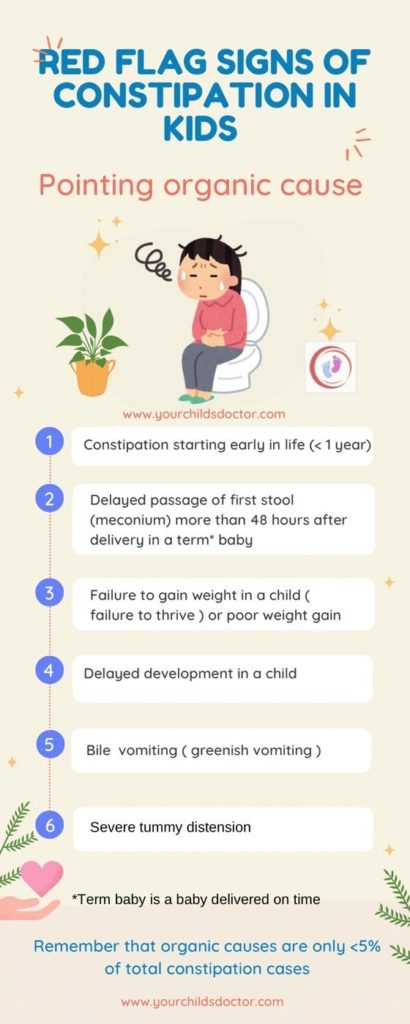
Pic -2 ( sign 7 to 12 )
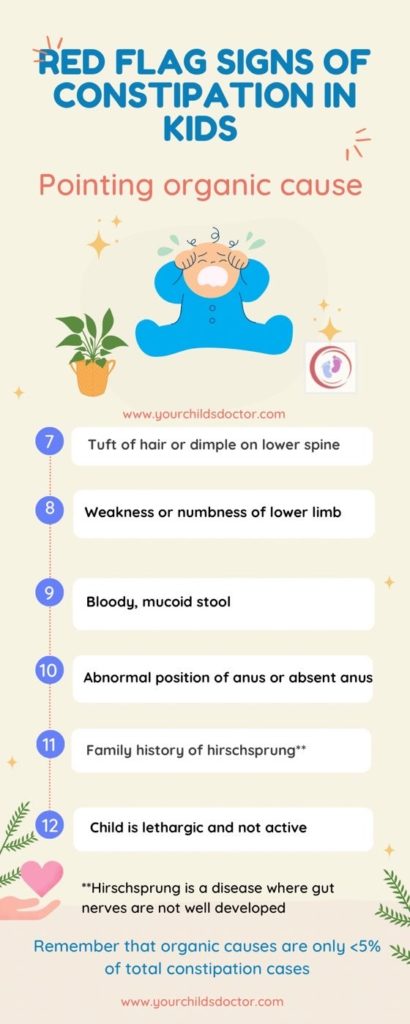
Conclusion
Many a times childhood constipation is overlooked. In such scenarios it may persist to adulthood. And this will hamper day to day lifestyle of a person, causing serious distress. Piles and anal fissures are few undesirable outcomes of constipation and hard stool.
So take care bowel of your kid and get help when needed. Share this article with your near and dear ones and benefit them.
Caution
All the information provided here are for educational and awareness purpose only. Kindly do not use these as alternative to medical consultation.

